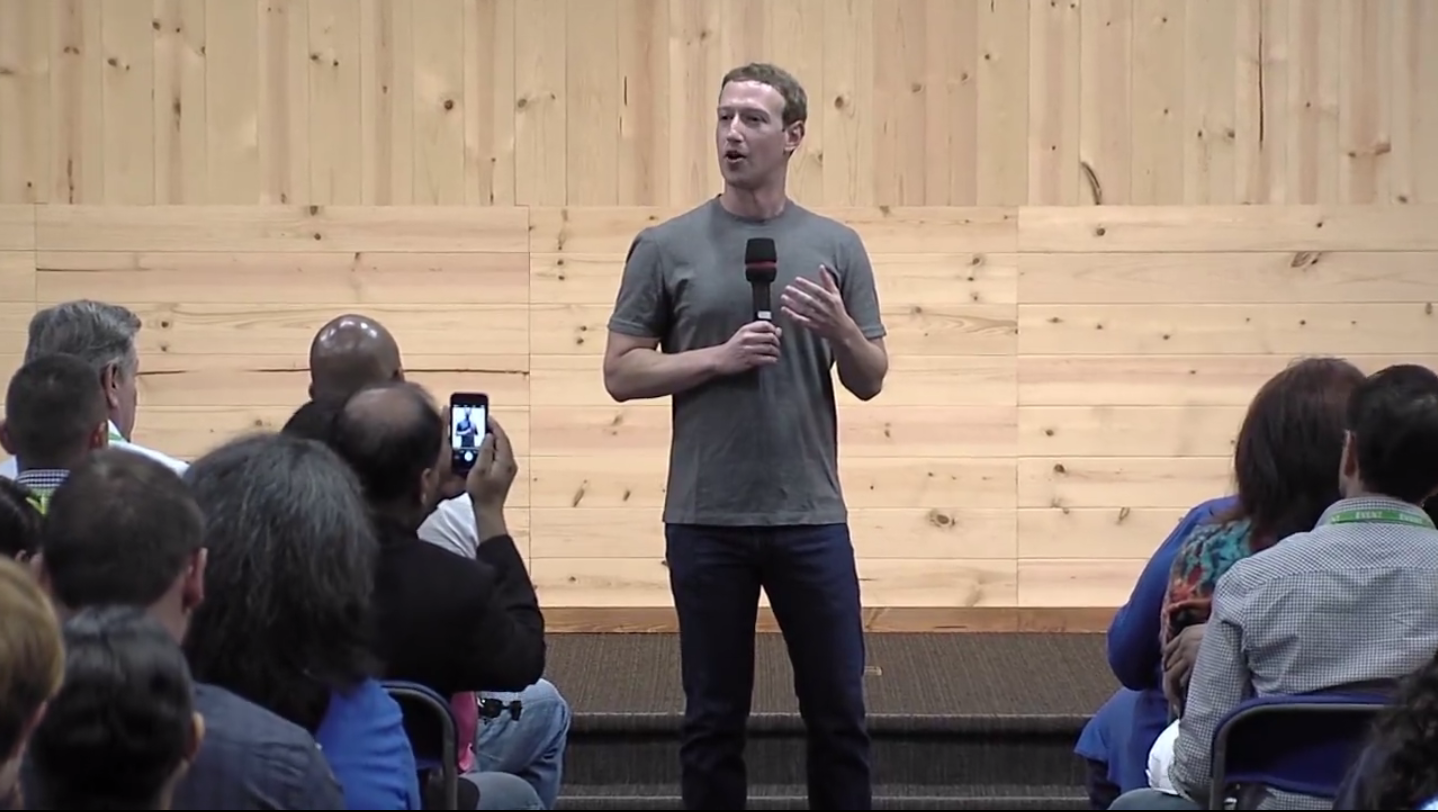
Every week for the past seven or eight years, Facebook has had internal question-and-answer sessions in which employees can pose questions to CEO Mark Zuckerberg on topics ranging from the social media site itself to the direction of the company. On Thursday, for the first time, Facebook opened up the event to the public, holding a livestream of its first ever public town hall meeting.
Prior to the event, Facebook crowdsourced questions on Zuckerberg's profile and asked the community to vote on questions by liking them. Here's a look at Zuckerberg's response to those popular questions and ones taken from the audience of Facebook users.
What's with Facebook Messenger?
The first question lobbed at Zuckerberg came from a woman from Ethiopia who bluntly asked, "Mark, why did you force us to install Facebook messenger?" He acknowledged it was a big thing to ask users to install yet another app, but he insisted there was a good reason.
"On mobile, each app really can focus on doing one thing well," Zuckerberg asserted. And in the case of the original Facebook app, that one thing is its newsfeed. In order to message a friend within the Facebook app, a user has to navigate away which takes time.
Zuckerberg explained that since people overwhelmingly rely on dedicated apps like iMessage or Whatsapp, which allow for speedy exchanges, it became clear Facebook needed a dedicated app of its own: Facebook Messenger. He went on to suggest that faster communication within the Facebook community outweighs the personal inconvenience of downloading the app.
Why are my posts not reaching as many people?
Another question came from a man in Pakistan: "I would like to ask when our Facebook fan page's reach will be coming back?" Many asked variations of this question prior to the event—fan page administrators are worried about the diminishing reach of their business' posts.
Zuckerberg delved into the reasons behind fan pages' smaller reach. "As time goes on, people are just sharing more things on Facebook.… There's just more competition," he said. He explained that each day, users have time to see less than 10 percent of all the stories posted by the people and pages they follow. To make sure that the approximately 100 stories they'll see are the posts that are most important to them, Facebook manipulates the newsfeed.
"Only the highest quality content is actually going to get through and shown to those people," he said. "So you really need to focus on continuing to make sure that you're pushing out good content." Though he didn't elaborate on what constitutes "good content," he did say the methodology behind the newsfeed algorithm is to provide users with the content that is most compelling and useful to them.
While Zuckerberg empathized with business owners who are impacted by the company's algorithm changes, he also somewhat dismissed the concern by saying that Facebook is "probably still overall a very good organic and free way to reach and communicate with your customers overall."
How about those Internet-beaming drones?
Zuckerberg then took questions from the live audience. Some Facebook users had been flown in, including one man from Florida whose question touched on a number of topics, including Facebook's use of drones to beam Internet to people without access. "There are about two-and-a-half billion people, 2.7 billion people who have Internet," Zuckerberg said. Facebook currently serves about 1.3 billion of them. "But the other four-, four-and-a-half billion don't…and we feel like we have the social responsibility to help spread the Internet and all the goodness that comes along with that." And by goodness, he probably means Facebook. Because you know what feels even better than reaching a billion people? Reaching 2 billion people. Or three…
What's next for Facebook?
Zuckerberg then took a question from a man from California who asked if Facebook was losing its charm. Zuckerberg responded that like water or electricity, Facebook should be "something people rely on, something people have and it doesn't always need to be in your face.… It just should work."
He also provided a glimpse into Facebook's possible future, saying that while the platform is primarily composed of image sharing at the moment, in five years it will be dominated by video.
"It's getting easier to capture video of the moments of your lives and share it, and…it's our job to make sure that that works," Zuckerberg said. On the mobile end, he said making the mobile app faster has occupied much of the company's time and will continue to do so.
Zuckerberg added that the company is working toward giving people more control of their own newsfeeds, in addition to the site adapting to show users the types of posts that they would typically engage with. He described controls where users could personally tailor their newsfeeds to show them more or less of certain types of posts, and predicted a roll out date of "over the next year."
Why the involvement in Ebola?
Zuckerberg also took a question about why he is getting involved in the fight against Ebola (he personally committed $25 million to the cause). "It's affected [10,000 to 13,000] people, which by itself makes it serious," he said.
"We're at this critical moment in time right now where if we focus on it and prevent it from spreading to the rest of Africa, to India, to Pakistan and Bangladesh and a lot of other big countries where a lot of health folks are really worried that it could spread…if we don't do that now, then it could be the next global epidemic."
Uncommon Knowledge
Newsweek is committed to challenging conventional wisdom and finding connections in the search for common ground.
Newsweek is committed to challenging conventional wisdom and finding connections in the search for common ground.
About the writer
Lauren is a reporter covering technology, national security and foreign affairs. She has previously worked on award winning teams at ... Read more





